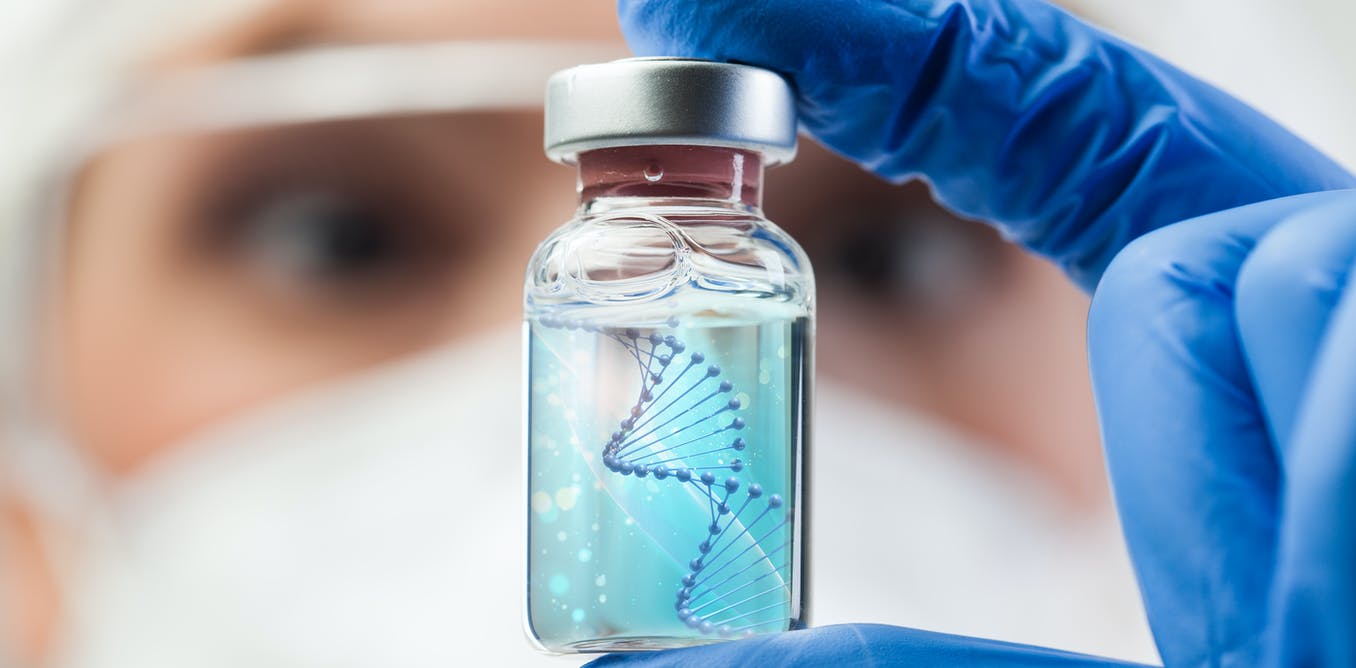mRNA vaccines, asteroid missions and collaborative robots: what to watch in science in 2022 – podcast

mRNA vaccines: not just for COVID. Cryptographer/Shutterstock
From new mRNA vaccines to space missions and developments in robotic automation, in this episode of The Conversation Weekly we talk to three experts about some scientific advances they’re watching out for in 2022. And we speak to an economist about trends in global inequality and whether it will get worse or better this year.
We start our 2022 science preview with vaccines. Scientists have been working on the mRNA technology behind the COVID-19 vaccines developed by Pfizer/BioNTech and Moderna for more than three decades. After its success at protecting people from severe COVID disease, researchers and drug companies are pushing ahead with trials of genetic-based vaccines for other diseases and conditions.
Deborah Fuller is a professor of microbiology at the School of Medicine University of Washington in the US and an expert in mRNA and DNA vaccines. She explains that not only can these kinds of vaccines induce an antibody response to fight off viruses, but they can also launch another type of immune response using our body’s T-cells. Fuller says this discovery “prompted additional thinking about how we could use this technology not just for infectious diseases, but also for immunotherapy of chronic infectious diseases or cancers”.
As researchers wait for the results of clinical trials on these vaccines, Fuller predicts the next big breakthrough could come in an mRNA vaccine for influenza. But, longer term, she thinks a universal or pan-vaccine could be on the horizon that protects against multiple strains of influenza or coronavirus in one shot.
From vaccines we head to outer space for a look at some of the missions planned for 2022 with Monica Grady, professor of planetary and space sciences at the Open University in the UK. In March, NASA will get its programme to send humans back to the Moon by 2024 underway with the launch of Artemis I, an important test of its new Space Launch System rocket and Orion spacecraft.
Grady is also excited about the August launch of a NASA mission to Psyche, an M-class asteroid made of metal. “We’ve never been close to an M-class asteroid before,” she says, explaining that its composition should be similar to the core of the Earth. Soon after, the Dart mission should arrive at the asteroid Didymos and its moonlet Dimorphos, to test what it would take to push an asteroid off a collision course with Earth in the future.
Read more:
Asteroids, the Moon and Mars: space missions to look forward to in 2022
Back on Earth, Teresa Vidal-Calleja, associate professor at the Robotics Institute and the University of Technology Sydney in Australia looks ahead to what developments in robotics might be around the corner. She expects there will be improvements in the way robots perceive the world in 3D, “working not only with images, but with other types of sensors”. She also expects more “cobots” – robots working in collaboration with humans in areas such as manufacturing, rather than just repeating repetitive tasks. This requires a lot more sensors but also algorithms that can predict the future so the robots can get better at making decisions.
Moving away from science in the final part of this episode, we speak to economist Carlos Gradín about the state of global inequality at the start of 2022. Gradín is a research fellow at the United Nations University World Institute for Development Economics Research in Helsinki in Finland, where he studies trends in global inequality. “We will see a lot of inequality in the recovery from the pandemic,” predicts Gradín. “Some projections indicate that, in general, advanced economies were affected the most, but they will also recover faster than low-income countries,” he says.
And Naomi Schalit, senior politics and society editor at The Conversation in Boston in the US, gives us some recommended reading to mark the first anniversary of the attack on the Capitol in Washington DC.
This episode of The Conversation Weekly was produced by Mend Mariwany and Gemma Ware, with sound design by Eloise Stevens. Our theme music is by Neeta Sarl. You can find us on Twitter @TC_Audio, on Instagram at theconversationdotcom or via email. You can also sign up to The Conversation’s free daily email here.
Newsclips in this episode are from Sky News, European Space Agency, NASA, CBS Evening News and Al Jazeera English.
You can listen to The Conversation Weekly via any of the apps listed above, download it directly via our RSS feed, or find out how else to listen here.

Deborah Fuller is co-founder of Orlance, Inc, a biotechnology company developing a needle free technology to deliver RNA and DNA vaccines. She also serves as a scientific advisor for HDT Bio, a biotechnology company developing RNA vaccines for COVID19 and other infectious diseases and scientific advisor for Abacus, Inc., a biotechnology company developing cancer vaccines. She receives funding supporting basic and translational research in RNA and DNA vaccines from the National Institutes of Health. Monica Grady is chancellor of Liverpool Hope University and a senior research fellow at London's Natural History Museum. She receives funding from Science and Technology Facilities Council and the UK Space Agency. Teresa Vidal-Calleja has received funding from the Australian Government through the Australian Research Council’s Discovery Program and Industrial Transformation Research Program, Meat and Livestock Australia, Department of Agriculture and Water Resources, Innovative Manufacturing Cooperative Research Centre and form industry and university partners. She is board member of the Australian Robotics and Automation Association.
Carlos Gradín does not work for, consult, own shares in or receive funding from any company or organisation that would benefit from this article, and has disclosed no relevant affiliations beyond their academic appointments.







